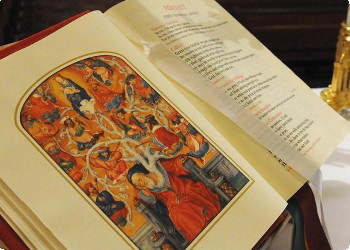He said, “The Son of Man must suffer greatly”
27 SEPTEMBER (Lk 9,18-22)
Jesus begins to unify the prophecies about the Messiah of God solely on his person. In the Old Testament the prophecies about the Anointed One that must come are many. However, they are all loose, separate, contained in many books, of many years apart from one another. A distorted reading causes that the many prophecies relate to many, various and different people. The true reading, the one that Jesus gives, unifies the many prophecies in one person. Today, Jesus unites on himself the prophecy of Daniel on the Son of man and that of the prophet Isaiah about the Suffering Servant of the Lord. Let us read them.
As the visions during the night continued, I saw One like a son of man coming, on the clouds of heaven; When he reached the Ancient One and was presented before him, He received dominion, glory, and kingship; nations and peoples of every language serve him. His dominion is an everlasting dominion that shall not be taken away, his kingship shall not be destroyed (Dn 7,13-14).
He grew up like a sapling before him, like a shoot from the parched earth; There was in him no stately bearing to make us look at him, nor appearance that would attract us to him. He was spurned and avoided by men, a man of suffering, accustomed to infirmity, One of those from whom men hide their faces, spurned, and we held him in no esteem. Yet it was our infirmities that he bore, our sufferings that he endured, While we thought of him as stricken, as one smitten by God and afflicted. But he was pierced for our offenses, crushed for our sins, Upon him was the chastisement that makes us whole, by his stripes we were healed. We had all gone astray like sheep, each following his own way; But the Lord laid upon him the guilt of us all. Though he was harshly treated, he submitted and opened not his mouth; Like a lamb led to the slaughter or a sheep before the shearers, he was silent and opened not his mouth. Oppressed and condemned, he was taken away, and who would have thought any more of his destiny? When he was cut off from the land of the living, and smitten for the sin of his people, A grave was assigned him among the wicked and a burial place with evildoers, Though he had done no wrong nor spoken any falsehood. (But the Lord was pleased to crush him in infirmity.) If he gives his life as an offering for sin, he shall see his descendants in a long life, and the will of the Lord shall be accomplished through him. Because of his affliction he shall see the light in fullness of days; Through his suffering, my servant shall justify many, and their guilt he shall bear. Therefore I will give him his portion among the great, and he shall divide the spoils with the mighty, Because he surrendered himself to death and was counted among the wicked; And he shall take away the sins of many, and win pardon for their offenses (Is 53,2-12).
Peter and the other Apostles walk with Jesus; however, for them he is the Jesus of only one prophecy: the one uttered by God to David, that of the eternal kingdom that will never end. Other prophecies are ignored by them. These do not concern the person of Jesus. He is the Messiah of the Lord, the Son of Man that receives honour and glory. Today Jesus tells them that he is also the suffering Servant. He is the one who carries on his shoulders the sin of the world. The sin is ours, but it is he who brings it in our stead.
Once when Jesus was praying in solitude, and the disciples were with him, he asked them, “Who do the crowds say that I am?” They said in reply, “John the Baptist; others, Elijah; still others, ‘One of the ancient prophets has arisen.'” Then he said to them, “But who do you say that I am?” Peter said in reply, “The Messiah of God.” He rebuked them and directed them not to tell this to anyone. He said, “The Son of Man must suffer greatly and be rejected by the elders, the chief priests, and the scribes, and be killed and on the third day be raised.”
Peter confesses that Jesus is the Christ. This confession is true. But it is partial, incomplete. It lacks the mystery of death and resurrection. It is deprived of the mystery of the delivery by his people to the Gentiles so that he is crucified by them. An incomplete prophecy is not the truth, even if it is a truth. Today we also speak of Jesus by incomplete, disconnected and separated prophecies from each other. We talk about Jesus saying some truths and ignoring others. The confusion is great. The risk is very high. We are losing the truth of our faith, because we have lost the truth on which it is based. The courage to unite all the truths about Lord Jesus is urgent.
Virgin Mary, Mother of the Redemption, Angels and Saints help us in this mission.





